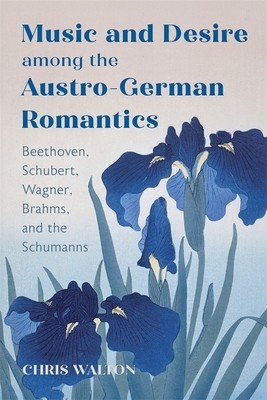
- We will send in 10–14 business days.
- Author: Chris Walton
- Publisher: University of Rochester Press
- ISBN-10: 1648251102
- ISBN-13: 9781648251108
- Format: 15.2 x 22.9 x 1.8 cm, kieti viršeliai
- Language: English
- SAVE -10% with code: EXTRA
Reviews
Description
Investigates the composition and reception of works by key representatives of Austro-German Romanticism - Beethoven, Schubert, Brahms, Wagner, and the Schumanns - with attention to the role of sexual desire in the composers' lives and music.
Scholars have for several decades been devoting increasing attention to aspects of sexuality and desire in the music of the Austro-German Romantics. Undertaking a close analysis of the sources, the four chapters of this book show how our assumptions about what those composers desired are often in fact contingent on what we, their commentators, have wanted them to desire over the course of reception history. Beethoven's Fidelio and Schubert's Winterreise tend to be regarded as a hymn to freedom, on the one hand, and an interior monologue of an alienated lover, on the other, though in neither case does such a view correspond to what the composer intended. In contrast, Richard Wagner dismissed his own opera The Ban on Love as a youthful indiscretion extolling the "free love" of the Young German movement; but he was reinterpreting an early work to align it with his later aesthetic. The final chapter examines the chronology of the friendship of Robert and Clara Schumann and Johannes Brahms in order to discern the likely truths about their triangular relationship before and after Robert Schumann's incarceration in a mental asylum. By adhering to the sources and placing them in the social, linguistic, and geographical contexts of their time, author Chris Walton grants all these protagonists a greater agency of desire than has hitherto been the case.EXTRA 10 % discount with code: EXTRA
The promotion ends in 23d.19:18:52
The discount code is valid when purchasing from 10 €. Discounts do not stack.
- Author: Chris Walton
- Publisher: University of Rochester Press
- ISBN-10: 1648251102
- ISBN-13: 9781648251108
- Format: 15.2 x 22.9 x 1.8 cm, kieti viršeliai
- Language: English English
Investigates the composition and reception of works by key representatives of Austro-German Romanticism - Beethoven, Schubert, Brahms, Wagner, and the Schumanns - with attention to the role of sexual desire in the composers' lives and music.
Scholars have for several decades been devoting increasing attention to aspects of sexuality and desire in the music of the Austro-German Romantics. Undertaking a close analysis of the sources, the four chapters of this book show how our assumptions about what those composers desired are often in fact contingent on what we, their commentators, have wanted them to desire over the course of reception history. Beethoven's Fidelio and Schubert's Winterreise tend to be regarded as a hymn to freedom, on the one hand, and an interior monologue of an alienated lover, on the other, though in neither case does such a view correspond to what the composer intended. In contrast, Richard Wagner dismissed his own opera The Ban on Love as a youthful indiscretion extolling the "free love" of the Young German movement; but he was reinterpreting an early work to align it with his later aesthetic. The final chapter examines the chronology of the friendship of Robert and Clara Schumann and Johannes Brahms in order to discern the likely truths about their triangular relationship before and after Robert Schumann's incarceration in a mental asylum. By adhering to the sources and placing them in the social, linguistic, and geographical contexts of their time, author Chris Walton grants all these protagonists a greater agency of desire than has hitherto been the case.

Reviews